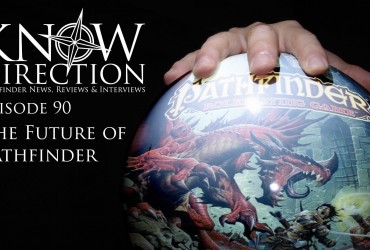Welcome to Guidance, Private Sanctuary’s source for tips and techniques for the Pathfinder Roleplaying Game, written by Everyman Gamer Alexander Augunas. Today, we’re going to be talking about spinning prophecies for your Pathfinder Roleplaying Game.
August is Harrow Month, and here at Guidance we’ll be looking at a slew of topics that will help you get the most out of your fortunetelling and prophetic muses in the Pathfinder Roleplaying Game!
One of the most classic elements of a fantasy is a good prophecy. Witches in tattered robes who provide ill omens and warnings of the future are always going to be a staple in fantasy writing, like it or not. If you’re like me, though, you probably find prophecies to be one of the most dog-gone difficult things in the world to write for an adventure. Today we’re going to talk a little bit about prophecy and how to design good ones for the purpose of roleplaying games.
Spontaneity
Let me preface with an anecdote. In my Mongrella campaign, I had an NPC who was an oracle of Apollo. If you’re familiar with Grecian mythology, Apollo was the god of omens and his oracles were said to know the future. In mythology most famous of Apollo’s oracles was cursed so that others would not believe her visions. I carried this over to my campaign and had an NPC oracle that knew everything that was going to happen.
Having an NPC like this is both a blessing and a curse. After a few bouts with her (the PCs brought her into their kingdom, so she was always around), the PCs quickly learned that she was on their side, but for whatever reason she was never frank with them; there was a method to her madness. So it would often go around that she would give out weird comments and advice and either the PCs would act on it or they wouldn’t. This is one why to make a “prophecy;” by telling your PCs weird, random things that may or may not have any impact on them at all but that you absolutely know will come to pass.
For example, the aforementioned oracle once gave one of my PCs the prophecy, “On sixth, sixth, sixth look underneath Apollo’s visage to find your path.” This prophecy was given to the PCs to help them find their way into a dungeon that they wanted to go adventuring in; it was located in the ruins of her temple (the PCs knew this) but the entrance had been blocked by a massive, crumbled statue of Apollo after an earthquake devastated the region. This is literally something that I made up on the fly, but such prophecies are often the best kinds.
The Best Kinds of Prophecies
When you boil things down, there are only two types of prophecy that you ever want to give PCs: 1) prophecies that have already come true and 2) prophecies that you are absolutely sure that your PCs will make true. The simple fact is that a prophecy loses a lot of its weight if it doesn’t actually come to pass and if the PCs prevent a prophecy from happening, it feels cheap to tell them, “Oh, someone else came along and did this thing, so the prophecy came true anyway.”
With this in mind, here are a few general tips when telling prophecies of all kinds; not just prophecies for your PCs.
- Prophecies are always better when flexible. You never want to say something like, “Valeros of Taldor is going to beat the Whispering Tyrant and destroy his phylactery, saving the Inner Sea from undeath.” That’s way too specific and if the game doesn’t take that turn, then you’ve just devalued the worth of prophecy in your campaign. Instead, leave your prophecy general and vague. In the above example, “A noble heir twice estranged will lay low the one who whispers.” If you’re familiar with Valeros’s backstory, it is pretty easy to see the correlations to the super specific prophecy I mentioned early. Unlike the first prophecy, which could only refer to Valeros, the second one I provided could refer to many PCs; in the Pathfinder setting alone, it could easily refer to Kess or Alain without much of a stretch and depending on how you interpret “noble heir,” it could open up to other PCs as well. And as for “one who whispers,” sure, that could definitely be the Whispering Tyrant, but it is vague enough that you could change villains around to whom the prophecy refers as the campaign progresses.
- Keep your prophecies short. Prophecies get hard to remember when they’re more than a sentence or two long, plus the longer your prophecy is it becomes less likely that it is flexible, as noted above.
- Never set a deadline for your prophecy. Although it can feel awesome for your PCs to race against the clock in order to make a prophecy happen, having a set timetable for a prophecy takes away a lot of the mysticism and mystery. Its like, “Really, you knew when this would happen down to the exact minute?” While it could be cool if you had a Mayan-like culture who had every event that would ever occur precisely predicted, in the long run the prophecy is going to end up feeling like the Mayan Calender scare a few years back; why this exact moment? Why not any of the other millions of moments? Sure, there’s magic, but precise prophecies tend to strain your player’s suspense of disbelief more than any other type of prophecy.
- Keep the Epic Prophecies in the Past. As mentioned, prophecies are cooler in a campaign setting when they’ve already happened. That’s because you can tell the PCs a prophecy and pan those prophecies out in a specific way without interfering with your PC’s gaming experience. This is honestly the major reason that the Pathfinder campaign setting chose to ‘break’ prophecies in its modern era. In short, feel free to break all of my above advice when the prophecy’s outcome has no mechanical or storyline consequences for your PCs. This isn’t to say that prophecies shouldn’t be big. Maybe a prophecy foretold that one of the PCs’ homes would be destroyed. While that certainly affects the PC, it doesn’t affect the PC while the player is playing him. In short, prophecies fail when they interfere with a player’s ability to play her character the way she wants.
Back to the Anecdote
So, how was the prophecy that I mentioned earlier fulfilled? Well, the PCs went rooting around the temple looking for the entrance. They got there on a Friday and spent all day searching. The PC to whom the prophecy was given unknowingly camped in the oracle’s living quarters and the next morning, he saw Apollo’s face under him. I gave him an Intelligence check to remember the prophecy and when he succeeded, he asked me what day it was. I responded, “It is Saturday, the sixth day of the week. This month, it is also the sixth day in the month. Finally, you woke and noticed this around six o’clock in the morning.
I could have changed sixth, sixth, sixth a LOT in order to suit my needs. This is just how the dice fell, and it is what makes a prophecy feel more legitimate. At least, when used in small doses while we’ll talk about that later in Harrow Month. For now, what do you think? How do you use prophecies in your campaign? Leave your comments and questions below and I foresee that you will return next Monday for another all-knew installment in the GM Guide! Don’t make my prophecy untrue!
Alexander “Alex” Augunas has been playing roleplaying games since 2007, which isn’t nearly as long as 90% of his colleagues. Alexander is an active freelancer for the Pathfinder Roleplaying Game and is best known as the author of the Pact Magic Unbound series by Radiance House. Alex is the owner of Everyman Gaming, LLC and is often stylized as the Everyman Gamer in honor of Guidance’s original home. Alex’s favorite color is blue, his favorite Pathfinder Race/Class combination is kitsune oracle but no one ever believes his predictions. Ever.







We avoid prophecies. My group is waaay to chaotic to try and predict things that will happen barring highly generic things about plot events that *must* happen in order to advance. The only ‘prophecy’ our group has ever used to my knowledge, is the one for Curse of the Crimson Throne that talks about Castle Scarwall. So in over 10 years, we’ve had a single useage of prophecy.